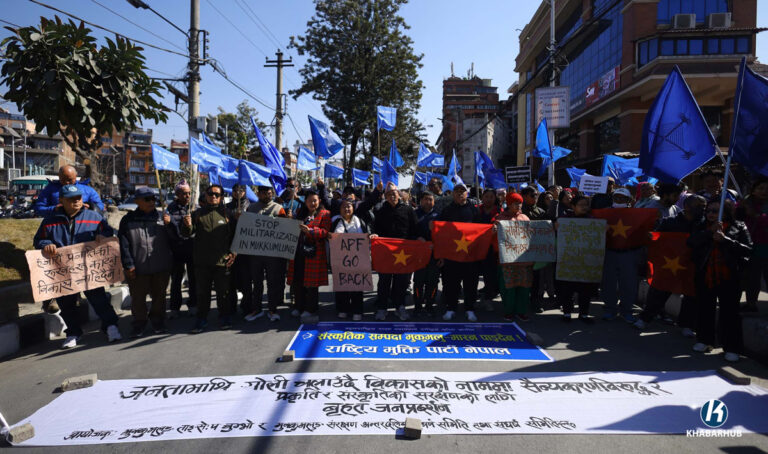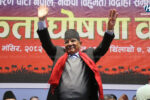KATHMANDU: Tensions have escalated in Taplejung following a police shooting on January 25 that left two protesters seriously injured.
The individuals were part of the ‘No Cable Car Group’, which has been voicing strong opposition to the construction of a cable car in Pathibhara in the district.
In response to the police action, activists declared an indefinite strike beginning January 28, which has disrupted four-wheeled vehicle movement throughout the region.
The protests have not only caught the attention of locals but also sparked widespread support online, as people from across Nepal join in opposing the project.
The ongoing dispute surrounding the construction of a cable car in Taplejung, particularly in the Pathibhara region, has gained significant attention due to escalating protests and a police shooting incident. Here’s a breakdown of the key details:
The Cable Car Project
The Mukkumlung Cable Car project, initiated by Pathibhara Darshan Cable Car Pvt. Ltd., aims to enhance tourism in Taplejung by providing easier access to Pathibhara, a popular pilgrimage site.
The project was approved by the government in 2018 and is part of a broader plan to develop ropeways in scenic locations across Nepal.
The Home Ministry stated that the team is led by Joint Secretary of the Home Ministry, Prem Prasad Bhattarai, and will include representatives from the Ministry of Federal Affairs and General Administration, Ministry of Culture, Tourism and Civil Aviation, and Ministry of Urban Development.
Khabarhub delves into the facts surrounding the cable car initiative, offering a detailed overview of the controversy in Pathibhara.
The project, backed by businessman Chandra Dhakal through Pathibhara Darshan Cable Car Pvt. Ltd., was approved by the government.
Named the Mukkumlung Cable Car, the plan is part of Nepal’s broader push to develop ropeways for tourism in picturesque areas, with Dhakal also proposing cable car projects in other protected sites such as the Annapurna Conservation Area.
Despite the project’s promise of boosting Nepal’s transportation sector and attracting religious tourism, it has faced significant opposition, particularly from the Limbu community.
For the Limbu community, Pathibhara is a sacred site integral to their Mundhum tradition, which holds nature in high spiritual regard.
The planned cable car, which would involve extensive deforestation, has raised concerns that it could compromise the spiritual significance of the area.
This tension between development and the protection of indigenous cultural heritage has led to protests that have gained momentum in recent weeks.
The controversy
The project has sparked strong opposition, particularly from the Limbu community, for whom Pathibhara holds deep religious significance.
Pathibhara is considered a sacred site in the Mundhum tradition, and the construction of the cable car threatens to disturb the spiritual and cultural integrity of the area.
There are also environmental concerns, with thousands of trees being cut down for the project, raising fears of deforestation.
Environmentalists have also voiced concerns, criticizing the project for the thousands of trees already cut down.
Protesters have stated they will continue their demonstrations until their demands are met, which include halting construction, withdrawing the heavy police presence, taking action against those responsible for the January 25 shooting, and providing compensation to the injured.
Additionally, the protesters claim that three individuals were wrongfully arrested and demand their release.
Protests and clashes
Protests have intensified in recent weeks. On January 25, police opened fire on protesters in Phungling Municipality-11, Pathibhara, injuring two members of the No Cable Car Group, who had been actively opposing the project.
Activists declared an indefinite strike in Taplejung and surrounding areas, which disrupted vehicular movement and drew nationwide attention.
Shree Lingkhim, the committee’s coordinator, criticized the government’s approach, stating, “The government’s disregard for our voices shows its authoritarian and undemocratic nature. In the name of development and tourism, they are attacking our religion and beliefs.”
He expressed concerns that the cable car would result in job losses for porters and negatively affect the local hotel industry.
Meanwhile, on Monday, indigenous communities from the Pathibhara area of Taplejung staged a protest in Kathmandu regarding the construction of a cable car in their region.
The protesters alleged that a private company, led by Chandra Dhakal, was granted permission to build the cable car in the Pathibhara area without consulting the local residents.

As part of the protest, a symbolic demonstration was held at Maitighar Mandala in Kathmandu, featuring a street play that depicted the violent clash that occurred in the Pathibhara area.
Protesters’ demands
The protesters have outlined a series of demands, including an immediate halt to the construction of the cable car project, the withdrawal of heavy security forces from the area, and compensation for individuals injured in the January 25 shooting.
They are also calling for accountability, demanding action against those responsible for the police shooting, as well as the release of three individuals whom they claim were wrongfully arrested.
Government forms talks team
The government on Sunday evening (February 2) formed a team to engage in dialogue with stakeholders to resolve the issues arising during the construction of the cable car at Pathibhara (Mukkumlung) in Taplejung.
The destruction of thousands of trees for the cable car’s construction has sparked criticism from climate change activists, who are concerned about the environmental impact.
The Home Ministry stated that the team is led by Joint Secretary of the Home Ministry, Prem Prasad Bhattarai, and will include representatives from the Ministry of Federal Affairs and General Administration, Ministry of Culture, Tourism and Civil Aviation, and Ministry of Urban Development.
Ram Chandra Tiwari, Joint Secretary and Spokesperson of the Home Ministry, urged the protesting parties to withdraw their protest programs and work together through dialogue to resolve the issues.
The talks team will begin its work immediately, and the Home Ministry has also requested the Ministry of Federal Affairs and General Administration to continue efforts to address the cable car-related challenges.
Government and local reactions
The government, however, defends the project, arguing that the cable car will benefit the local economy by boosting tourism and making the area more accessible to elderly and disabled visitors.
Local authorities, including the mayor of Phungling, have expressed that the majority of locals support the project, accusing activists from outside Taplejung of politicizing the issue.
Escalating strikes
The Mukkumlung Conservation Joint Struggle Committee, a key opposition group, has announced that if their demands are not met by February 1, they will expand their protests to other districts, including Sunsari, Jhapa, Morang, Dhankuta, and Illam.
Environmental and cultural concerns
Environmentalists and cultural preservationists argue that the project threatens both the natural landscape and the cultural sanctity of the region.
The destruction of thousands of trees for the cable car’s construction has sparked criticism from climate change activists, who are concerned about the environmental impact.









Comment